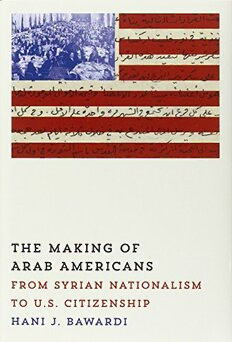
The Making of Arab Americans: From Syrian Nationalism to U.S. Citizenship PDF
Preview The Making of Arab Americans: From Syrian Nationalism to U.S. Citizenship
The Making of Arab Americans Banquet honoring delegations of Arab states to the United Nations, November 1946. Courtesy of the Immigration History Research Project, University of Minnesota. From Syrian The Making of Nationalism Arab Americans to U.S. Citizenship Hani J. Bawardi University of Texas Press Austin Copyright © 2014 by the University of Texas Press All rights reserved Printed in the United States of America First edition, 2014 Requests for permission to reproduce material from this work should be sent to: Permissions University of Texas Press P.O. Box 7819 Austin, TX 78713-7819 http://utpress.utexas.edu/index.php/rp-form Th e paper used in this book meets the minimum requirements of ANSI/NISO Z39.48-1992 (R1997) (Permanence of Paper). Library of Congress Cataloging-in-Pulication Data Bawardi, Hani J. Th e making of Arab Americans : from Syrian nationalism to U.S. citizenship / Hani J. Bawardi. — First edition. pages cm Includes bibliographical references and index. ISBN 978-0-292-75748-6 (cloth : alk. paper) 1. Arab Americans—Politics and government—20th century. 2. Arab Americans—Societies, etc.—History—20th century. 3. Arab Americans—History—20th century. 4. Arab Americans—Ethnic identity. 5. Arab nationalism—History—20th century. 6. Syria— Emigration and immigration. I. Title. E184.A65B38 2014 305.892′7073—dc23 2013039741 For Rushd (Roy) Farah, the son of Ameen Saleh Ya(cid:2)qoub Farah. Rushd was born December 16, 1922, and died June 21, 2013. You say what, then, can the Syrian do if you rob him of his hope of a reformed future in the lands of his birth and childhood? . . . Th e Syrian only has self-reliance and utilizing his talents, intelligence, and excellence to rely on. . . . Every word a pupil learns in the American schools is a word learned by all Syrians. . . . Free your children from the slavery of stagnant traditions and old customs, and they will remain free even in chains and jails. Gibran Khalil Gibran, Contents Acknowledgments ix Note on Arabic Names and Terms xiii Introduction Chapter 1 39 Arab Populations under Ottoman Rule: A Background Chapter 2 54 The Syrian Nationalism of the Mahjar Press Chapter 3 81 Soldiers for Syria before World War I: The Free Syria Society Chapter 4 104 The “Syria Idea” and the New Syria Party Chapter 5 159 The Mandate Years and the Diaspora: The Arab National League and a Historical Context for Arab American Narrative Chapter 6 190 The Arab National League and the Emergence of Arab American Identity Chapter 7 239 The Institute of Arab American Affairs: Arab Americans and the New World Order Conclusion Notes Bibliography Index THIS PAGE INTENTIONALLY LEFT BLANK Acknowledgments Meaningful research on the Arabic-speaking pioneers in the United States can take place only if their stories are faithfully captured. It is my privilege and honor to be entrusted by Roy (Rushd) Farah with the manuscripts of his father, Ameen Farah (1888– 1975). I am deeply indebted to Roy and his wife, Pauline, of Grand Blanc, Michigan, for opening their home and their hearts to my family. Th ey will always have a place in our hearts. Ameen’s papers enriched my life beyond measure and provided the tools for advancing the nascent studies on the early Arab immigrants in the United States. I am deeply grateful to Joy Totah Hilden for giving me unfettered access to the papers of her father, Dr. Khalil Totah, in her home in Berkeley, Cal- ifornia. Khalil Totah’s work as the director of the Institute of Arab Ameri- can Aff airs from 1945 to 1950 deserves dedicated research beyond the chap- ter on the institute in this book. I am very grateful to my dear friends and neighbors in Ann Arbor, Michigan, Amal Dalack and her husband, Gregory Dalack, a great-grandson of Orthodox Archpriest Basil M. Kherbawi. Father Kherbawi spent a lifetime in the service of his countrymen. I vow to con- tinue translating to completion “Syrian Immigration to the United States,” which he published in 1913. It has been a privilege to get to know Dr. Fuad Isa Shatara, the founder of the Arab National League, better, thanks to his granddaughter Barbara Tate Cerato; her mother, Gina Shatara; and her aunt, Hope Murphy Shatara. Th e family provided Dr. Shatara’s pictures and an audio disk from the 1930s. Gina Shatara shared her fond memories of this truly remarkable man. Th e research in this book on Dr. Shatara only begins to explore the staggering importance of this statesman, author, surgeon, and man of peace and vi- sion. Arab Americans suff ered a profound loss when Fuad Isa Shatara died on January 8, 1942, at the early age of forty-eight. His vision of coexistence and peace in Palestine lives on through his writings, letters, and commen- tary in archival repositories from Jerusalem to New York to Flint, Michigan. Although I had little success in locating the descendants of H.abīb Ibrahīm Kātibah, his writings and importance must also be remembered
